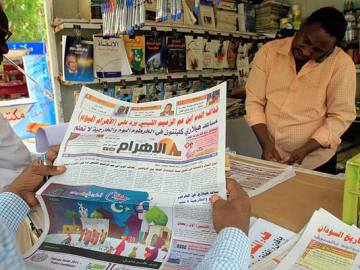Sudanese security confiscates Al-Gareeda newspaper
May 9, 2016 (KHARTOUM) – Chief Editor of Al-Gareeda newspaper Ashraf Abdel-Aziz said the Sudanese National Intelligence and Security Services (NISS) has seized print runs of his newspaper on Monday without stating reasons.

In a post on his Facebook page, Abdel-Aziz said the NISS confiscated 12,000 copies of Al-Gareeda without giving reasons.
In a statement issued on Monday, the non-governmental Journalists for Human Rights (JHR) network said two NISS agents came to the printing house at 2:00 am (local time) and confiscated the print runs.
JHR pointed the NISS had instructed newspapers on 28 April to not publish news of the recent university demonstrations and the detention and dismissal of the students, saying however few newspapers including Al-Gareeda didn’t comply with the orders.
According to JHR the NISS directive ordered the newspapers “not to publish any news reports that could promote violence and feed unrest and chaos and to only rely on official sources”.
JHR added that Al-Gareeda continued to cover news of the student protests with high professionalism particularly after the death of university students.
Two students Mohamed al-Sadiq of Omdurman Ahlia University and Abu Bakr Siddiq of Kordofan University were killed during violent clashes between government and opposition supporters respectively on 27 and 19 April.
Also, during the past weeks, the Sudanese capital has been the scene of student anti-government protests after statements by an official that the government is about to sell Khartoum University premises.
The media watchdog called on the newspapers and the journalists to cover the events with professionalism and to not respond to the NISS directives which “pose a blatant interference in the press affairs and clear violation of the freedoms of press, expression and opinion and the right to obtain and disseminate information to the public”.
Sudan’s constitution guarantees freedom of expression but laws subordinate to the constitution such as the National Security Forces Act of 2010 contains articles that can be potentially used to curtail press freedom and instigate legal proceedings against newspapers and individual journalists.
NISS usually accuses the newspapers of crossing the red lines through publishing reports which adversely impact the national security.
Sudanese journalists work under tight daily censorship controls exercised by the NISS.
They say that NISS uses seizures of print copies of newspapers, not only to censor the media but also to weaken them economically.
